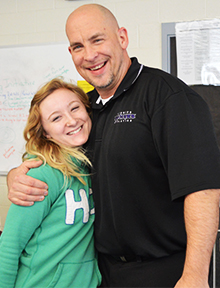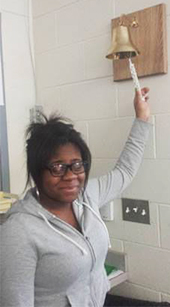When her mother died last summer, Wyoming Senior Tashia Sheneman lost a permanent place to live and has since moved several times. One of the few constants in her life is Wyoming’s Frontiers Program, where she receives much more than instruction.
Frontiers is hybrid program — a combination of online and classroom learning. It is located in Wyoming High School, but it provides a completely different learning environment for students, who work at their own pace, on their own time, with a great deal of support from staff who are more mentors than teachers.
Tashia has made serious headway since joining Frontiers last school year to catch up on credits she let slip as a freshman. She is now on track to graduating this fall, despite having no computer to work on from home, as she did before her mother passed and life became less certain.
“I’m good. I’m doing better than I was out there,” said Tashia, referring to the traditional high school program. “I feel like you have more support … and it’s more on your time and it prepares you for college,” she added, sharing plans to attend Grand Rapids Community College before attending Ferris State University to pursue her career goal of becoming a probation officer.

The Frontiers program offers students the option of approaching school differently than their peers. Using the online program Edgenuity to complete classes, they can work offsite as much as 50 percent of of the time. Extracurricular courses are taken at the traditional school, and students must complete all state graduation requirements. A waiver from the state, however, allows students to acquire a diploma without the traditional “seat-time” rule of 1,098 hours physically present in class.
This high school experience is as unique as are each of the students who walk
through the doors of Frontiers, which has grown from 10 students seven years ago to 62 today. It has enrolled a maximum of about 80 students, each of whom submits an application to be accepted into the program.
Frontiers opened with the idea that one size doesn’t fit all, explained Program Director Al Vigh. Some students, like Tashia, need to catch up on credits; others need more flexible school hours, and some want to take a class not offered at Wyoming High School. Others are cruising their way toward an early graduation. Family obligations, mental-health issues and medical needs also make Frontiers the school of choice for many students.
Individual options, individual support
Students are required to be at the building a certain number of hours per week depending on proficiency and progress, and to complete another 10-20 hours offsite. All tests are taken in the classroom, monitored by teachers.
“The better they do, the more flexibility they earn,” Vigh said. “They tell us when it’s convenient for them to be here.”
Because students don’t stop and start according to a bell that begins and end the day, they have to get used to a college-style model— students must learn how to manage their own schedules. Attendance is taken for time required on campus.
“We have our morning learners, our afternoon learners, our evening learners,” said mentor Tracey Davis-Replogle. “Big in the news now is how kids just don’t get up and running until the afternoon. Students have the opportunity to (come when they learn best), they’ve always had that opportunity (here).”
 “They are setting those long-term goals looking toward the future,” she said. Program requirements include a Postsecondary Education Pathway class, where students complete a resume, budget, college application, and a college visit.
“They are setting those long-term goals looking toward the future,” she said. Program requirements include a Postsecondary Education Pathway class, where students complete a resume, budget, college application, and a college visit.
Davis-Replogle, a longtime high school English teacher, said Frontiers refreshed her outlook on education.
“In here, we don’t call ourselves teachers, we are mentors. We build such deep relationships with students that it just gives you a whole new perspective. It gives the kids a whole new perspective as well, which is refreshing.”
She said regular teachers are often regarded as a “wardens” or adversaries, but as a mentor she receives thank-yous from students who she helps get through the curriculum. She walks in in the morning and is welcomed like “Norm, on Cheers,”
“It’s vanquished my long-term pessimism. I hope that I transfer that optimism over to the students. The kids don’t just ask me questions about the curriculum. They ask me a myriad of other questions, kind of like an aunt or a big-sister type question.”
While compiling credits, students learn important life skills as well. Not being directed by a teacher or school bell requires responsibility.
Senior Malik Claybrook, a self-proclaimed “people person” thought a blended program would help him focus, but, at first, it was hard for him to stay on task. With help from mentors, he stuck with it.
“I had to get used to the freedom,” he said. “It changed me maturity-wise.”
Going through a tough situation last summer, Malik picked up the phone and texted Vigh to tell him about what he was facing.
“We had a heart-to-heart. Having someone there you can talk to whenever is good because now he knows the situation I was in. But, it’s not just him, I can talk to any of the teachers back here,” Malik said.
CONNECT








